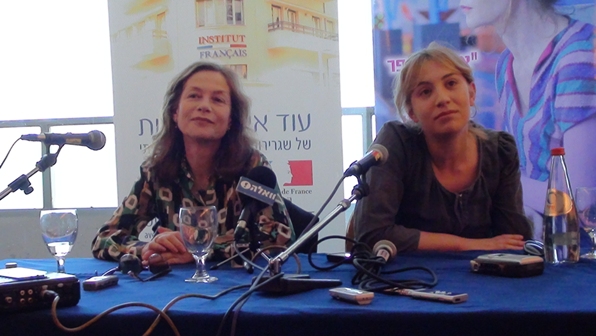
Isabelle Huppert performs brilliantly in any context – this morning’s press conference in Tel Aviv was no exception. Accompanied by her daughter and co-star Lolita Chammah, Huppert is in Israel this week for the screening of Copacabana, directed by Marc Fitoussi, which will be the closing film of the 8th French Film Festival, and will be released in Israeli theatres from April 14, 2011.
Copacabana centers on the rift between the free-spirited Babou, and her daughter Esmé, whose aspirations are far more sedate and conventional. The mother-daughter pair were both at ease with one another and the journalists on this sunny morning in Tel Aviv, as Huppert reflected on her role in the movie, saying, “I was interested in Copacabana precisely because she [Babou] is a very happy person, she is a very generous character and no matter all the difficulties she goes through, she is an optimistic character. And I guess it is Marc Fitoussi’s point of view to portray this small person, not only small inside, her life is small, but yet she has some kind of ideas and some dreams and she’s happy, she’s positive. That’s why I liked doing her, acting in this movie. But I’m not hysterically after happy characters [in terms of movie roles], because doing happy or unhappy characters has nothing to do with the degree of happiness you have in portraying these characters.”
Later Huppert said of Babou, “I think that she comes directly from certain ideology back in the 70s where people were maybe a bit more naïve. Where people didn’t think they have to work and then come the 80s where people start to think that they have to make money and there was more an individual sense of success, so she still carries these kind of values that some people now maybe go back to sometimes, but maybe of course, she does not understand that the world has changed. And meanwhile she had a daughter and this daughter is not exactly the product of her values but she’s the product of maybe her generation and as of course also as opposed to her mother’s generation she has some kind of other ideals, you know. Then come the conflicts, but of course usually the conflicts between parents and children are because the parents are more classical and the children carry the rebellion, but my daughter’s character is a rebellion in the other sense – she’s a rebellion to become the classical daughter – so that’s the interesting twist. But also what is nice is that at some point she has a certain consciousness to realize, because she’s really hurt when the daughter doesn’t want her to come to the wedding, she understands how the whole the gap has become so strong between the two of them. She’s smart enough and sensitive enough to make everything possible to build that relationship again. What is nice at the end is that they do come to each other but each of them is still staying in their own…it’s not that the mother has become the daughter or the daughter has become the mother. She’s getting married in her beautiful white dress and she’s going to go with the beautiful Brazilian dancer.”
What was it like for the real life mother-daughter pair to work together? Lolita Chammah replied, “It was quite easy actually. We don’t have many things to say about this, in the sense that it was quite natural to do it because we were already mother and daughter. The first day it was quite funny actually, because it was a strange situation to put an intime scene in a fiction but thanks to the director Marc Fitoussi, we were in trust and we didn’t think about our real relationship in life all the time, fortunately, because if yes, we couldn’t have done the movie.”
Both actresses expressed a great deal of admiration for the director of Copacabana, Marc Fitoussi, with whom Chammah had worked on a previous film. Huppert said in regard to Aure Atika’s role in the film that her character “reflects Fitoussi’s attitude towards his characters, he’s really so ironic and so cruel. Sometimes he really knows how to pin little details and yet he manages always to keep a certain humanity, he’s never contemptuous of his characters and actually Aure Atika’s character – she’s so pathetic, she’s so horrible and you can feel that she has this very narrow life where she only thinks about what she’s going to eat in the evening… I think she’s wonderful, I really like what she does as an actress and the way her character is written and I think that’s why I like Marc Fitoussi’s work, because he is on this very thin border: he is very critical and yet very human at the same time.”
Huppert parried questions with deft poise, every charming, every evasive. Asked whether there are Israeli directors with whom she would like to work, she responded, “Yes, I think we are going to meet a few directors. I think Israeli movies are so rich. I watch some of them before, not all of them. There are lots of people I would be most happy to share some kind of cinematic adventure with – I won’t tell you who, but when I do it you will know.” The actress was remained evasive on the topic of future work with directors, saying, “There are lots of people I would like to work with, yes… who would not have wanted to work with Ingmar Bergman or Alfred Hitchcock, but of course I’m more interested with people who want to work with me, but that I don’t know yet.”
Huppert was more forthcoming in talking about her past work with directors Claude Chabrol and Michael Haneke: “I did six or seven movies with Claude Chabrol and they have two opposites ways of working so it’s good to put them together. Michael Haneke is very demanding, and of course Chabrol was demanding too, but in a different way. Michael Haneke has a specific tune in mind and until you have not reached that specific note and tune he has in mind he will never let go of you. He’s really pushing it to an extreme and Chabrol has a totally different way of doing, he was very… he never intervened in what we were doing; he was just letting us go. I guess his mise en scene was so strong and he was so much in control in a way of what he was doing that he did not need to give you any indication and actually you could be very free.”
Huppert and Chammah seemed to reflect similar attitudes towards their work and cinema, both gracefully avoiding expressing specific preferences for contemporary directors and films in favor of generally embracing the art of cinema, with one difference. Asked whether she would ever want to direct, Huppert said, “Maybe…no.” Chammah however, said, “Maybe yes.” At which point her mother added that Chammah had already directed a small film and would probably continue to do more in the future, saying, “She will direct me.”
Copacabana (2010), directed by Marc Fitoussi, will be released in Israeli theatres on April 14th.






Comments are closed.